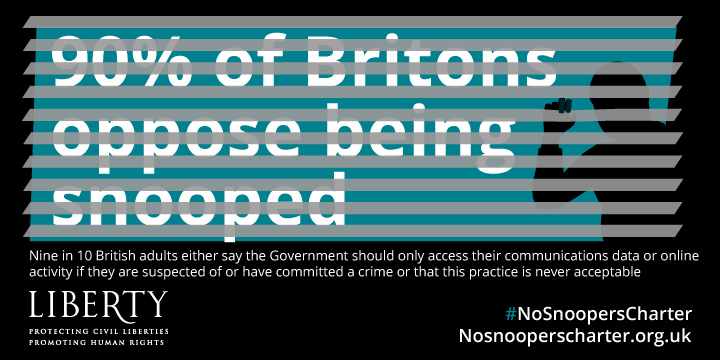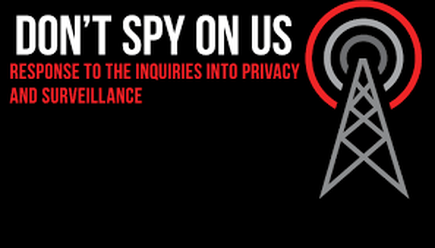|
Open Rights Group has responded to the publication of operational cases for the extensive surveillance powers laid out in the Investigatory Powers Act.
Executive Director Jim Killock said: “The government still hasn’t stated how it will respond to a CJEU ruling, which calls into question the legal basis for the current data retention regime. “The CJEU said that blanket data retention was not permissible and should only be used for serious crime. It also said that there needed to be independent authorisation for access to communications data. “The Government has yet to respond publicly to this ruling. It’s vital that the Government clarifies its position before the election.” ORG will deliver a letter to the Secretary of State and Shadow Ministers on Monday, urging the Government to present its plans before the election: https://action.openrightsgroup.org/investigatory-powers-act-government-must-come-clean-election The CJEU judgment relates to a case brought by Deputy Leader of the Labour Party, Tom Watson MP, over intrusive data retention powers in the Data Retention and Investigatory Powers Act (DRIPA). Open Rights Group intervened in the case together with Privacy International, arguing that DRIPA, which was rushed through parliament in 2014, was incompatible with EU law. While the judgment will no longer affect DRIPA, which expired at the end of 2016, it has major implications for the Investigatory Powers Act. In March, it appeared that the Government has accepted part of the CJEU ruling by issuing a tender on the UK Government Digital Marketplace, which called for businesses to help develop a new “independent communications data authorising body https://www.openrightsgroup.org/press/releases/2017/home-office-tender-suggests-government-has-accepted-cjeu-ruling-on-independent-authorisation-for-retained-data However, the Government has still not made a public statement about how it will respond to the judgement. More http://www.bbc.co.uk/news/uk-politics-35810628 https://www.opendemocracy.net/digitaliberties/rebecca-vincent/theresa-may-britain-proposed-new-espionage-act-is-alarming
0 Comments
Following events in London last week British Home Secretary Amber Rudd has set her sights on the Internet.
The UK already has the most snooping in the western world but Mrs Rudd wants more. Monday we received the following communication from the Open Rights Group. "Yesterday, Home Secretary Amber Rudd told Andrew Marr that it was “completely unacceptable” that the Government was unable to read messages sent via services such as WhatsApp who offer end-to end encryption. The Government likes to position this as a question of privacy versus security. This is wrong. As we pointed out in today's Guardian [1], encryption keeps us safe online, undermining it will make us all less secure. It may seem like she is asking for something she doesn’t understand. But she is Home Secretary and her advisors know exactly what they want – to strip away any possibility of privacy wherever they can. And they know companies are a soft target. Rudd also told Marr that the Government wanted to tackle the promotion of extremist content online by talking to people “who understand the necessary hashtags to stop this stuff ever being put up”. We’re not quite sure what this means and we don’t think Rudd knows either. This is one of the reasons why ORG exists - to explain to MPs and the media how technology and the Internet work, and in doing so, to protect the digital rights of people in the UK. If Amber Rudd gets away with blaming WhatsApp for terrorism, then WhatsApp may well decide to remove safe and secure encryption, just in order to manage their own public image. We can’t challenge this without the support of our members. Please join ORG today and help us to fight for your digital rights. Best wishes, Jim Killock PS. My blog outlines the vast surveillance powers that the UK Government has to investigate and prevent terrorist attacks. [1] WhatsApp must be accessible to authorities, says Amber Rudd – The Guardian https://www.theguardian.com/technology/2017/mar/26/intelligence-services-access-whatsapp-amber-rudd-westminster-attack-encrypted-messaging _______________ Jim Killock Executive Director Open Rights Group" https://www.openrightsgroup.org/campaigns/ MPs have voted to allow a new regulator - expected to be the BBFC - to censor legal porn websites. Amendments to the Digital Economy Bill were accepted by MPs during its third reading yesterday. This will mean that the the BBFC in its new role can instruct Internet Service Providers to block access to porn websites that don’t verify the age of their users, even though their content is legal in the UK.
In addition, sites that are not sanctioned must obey the regulator’s instructions and censor what is deemed unacceptable. The BBFC has indicated that:
Executive Director, Jim Killock said: “If the Digital Economy Bill is passed, the BBFC will have the power to instruct ISPs to block thousands of websites. This is unprecedented in the UK and the developed world. “In the short term, this is likely to disproportionately affect sexual minorities. However, there are wider implications for free speech. Once this administrative power to block websites is in place, it will invariably be used to censor other content. MPs have already asked why other material that is unsuitable for children is not being censored.” In addition, the proposals to demand that pornographic websites use age verification technology still have no privacy safeguards. Labour tabled an amendment outlining privacy duties for the regulator, but this was not adopted. The Government did not table any alternative privacy amendments. Killock added: “Websites could choose age verification tools that cause risk data leaks, tracking and even encourage credit card fraud unless the government place privacy standards into the bill. “This is incredibly irresponsible.” More than 11,000 people have signed an Open Rights Group petition calling for parliament to reject these plans: https://www.openrightsgroup.org/campaigns/digital-economy-bill-hub/stop-uk-censorship-of-legal-content This would create a “backdoor” to allow access to any encrypted file including personal conversations, medical records, and banking documents.
In the UK, members of the Don't Spy on Us coalition have also written to the Home Secretary to ask for clarification about provisions in the draft Investigatory Powers Bill. The draft Bill, which is being scrutinised by a parliamentary Joint Committee, currently includes provisions that would allow the Secretary of State to impose obligations on companies that would include the “removal of electronic protection.” In their letter, the Don't Spy on Us coalition point out that encryption keeps Internet users around the world safe and secure: “Encryption protects billions of people every day against threats, including criminals trying to steal our phones and laptops, cyber criminals trying to defraud us, or foreign intelligence agencies targeting companies' valuable trade secrets... Weakening the general security and privacy of communications systems erodes protections for everyone, and undermines trust in digital services.” Don't Spy on Us are calling for the UK government to state on the record that they do not intend to undermine digital security. Director of Don't Spy on Us, Eric King said: "Technology companies, civil society groups and academics have all sounded the alarm bell about obscure clauses in this bill that could force companies to weaken the security in technologies we all rely on everyday. The US, the Netherlands, and Finland have all made public statements recognising the public importance of strong encryption in recent months. We want a clear unambiguous statement from the Home Secretary that this bill won’t be used to backdoor encryption, to put peoples concern to rest, once and for all." For further information, contact: Eric King, Director of Don’t Spy on Us: 07986 860 013 Pam Cowburn, Communications Director, Open Rights Group: 07749785932 [The Don't Spy On Us is a coalition of organisations who defend privacy, free expression and digital rights in the UK and in Europe. Its executive includes Article 19, Big Brother Watch, English PEN, Liberty, Privacy International and Open Rights Group. The full letter to Home Secretary Theresa May is published here: https://www.dontspyonus.org.uk/blog/2016/01/11/letter-to-home-secretary-calling/ The letter to world leaders was organised by Access Now and is now open to public support: https://www.SecureTheInternet.org] |
Yourvoice
This blog will include a range of reports and opinion pieces covering many issues. It will be YOUR Voice. Archives
April 2017
Categories
All
|







 RSS Feed
RSS Feed
